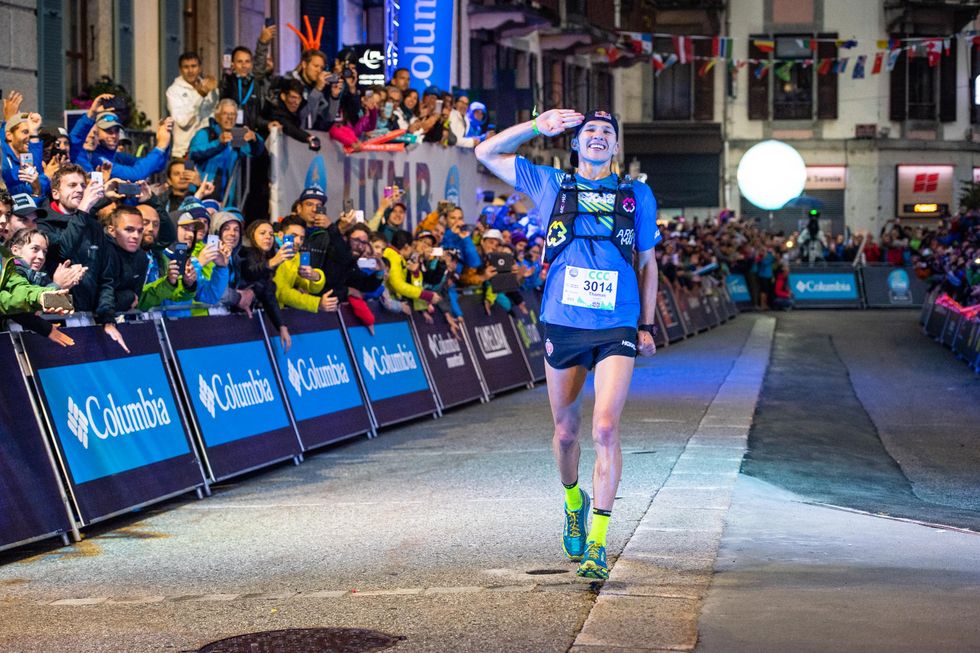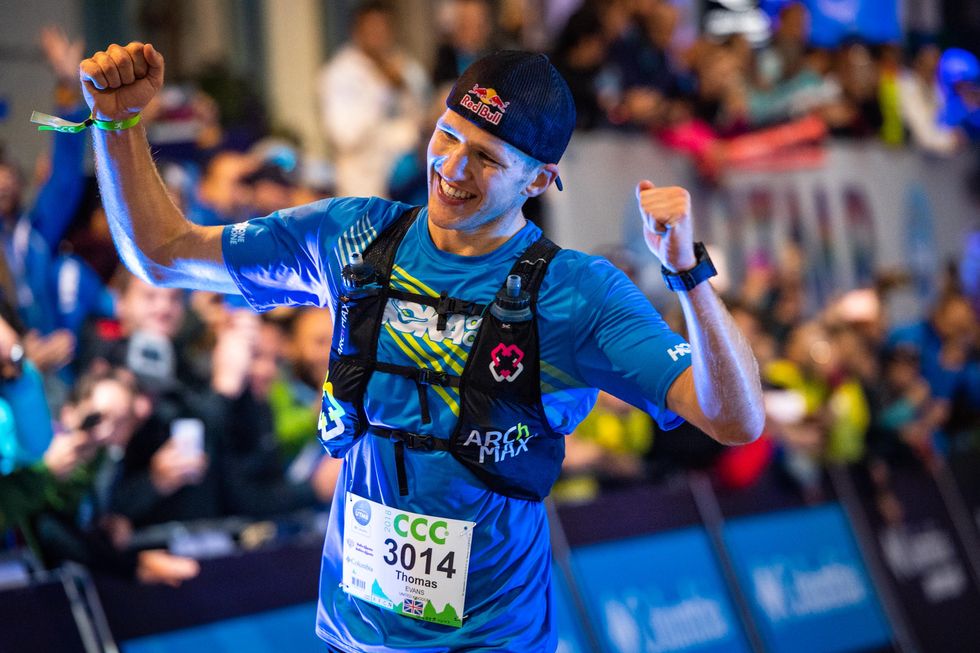British runner Tom Evans exploded onto the ultra running scene back in 2017 when he shocked the field and took third place at the Marathon Des Sables, despite being completely unknown to the ultra-endurance world. Just 18 months later he’s gone one better at the Ultra Trail du Mont Blanc. The athlete stormed past China’s Min Qi with less than 10km of the 101km CCC to go, to take the podium top spot and cement his place as one of the UK and the world’s top ultra runners.
It’s an incredible rise to ultra running fame for the British Army officer who only took on the Marathon des Sables because of a bet with his friends and now seemingly has the world at his feet.
We caught up with Evans just hours after he crossed the finish line in Chamonix to find out how he beat some of the world’s finest trail runners to win one of the most respected races on the ultra calendar, and to hear about his road running ambitions for Commonwealth and Olympic marathon success.
So Tom, you came to Chamonix in 2017 and came fourth, now 12 months on you’ve just been crowned CCC champion after an incredibly tight race, tell us how it played out there on the mountains.
“The first 20km of the race was good for me and I was in the place that I wanted to be. I wanted to get to the top of the first climb in the Top 10 and I did that. But at about 30km and I started having real stomach problems, I couldn’t eat or drink anything and was being sick.
Related: UTMB 2018 race report
“At 45km I convinced myself that I was going to pull out. But the only way back to Chamonix is to reach the next checkpoint, so I ran that anyway. When I got there, seeing my crew and friends gave me a new lease of life, a big boost and with the next checkpoint only 12km away I thought I might as well just head there and see how I was feeling. By that point I was fluttering somewhere between 4th and 6th which was roughly where I’d want to be.”
Did you think then that you had a chance of reining in China’s Min Qi who had taken the race on and led from the start?
“Min Qi went out super hard and thought ‘my goal is to win this race’. But my main goal is to be the best athlete that I can possibly be, and if my best is good enough to be the best, then that’s amazing. If there’s someone better on the day then well done them.
“But the thing I love about ultra running is there are so many external uncontrollable factors. My mantra with my training group is process not outcome, and that’s small scale in the short term and the long term. It’s the whole process, get everything ticked off and the outcome will look after itself.
“So for example, in a 12-week training block we identify the key sessions each week and if you need to miss a session you make sure it’s not one of these. Whatever happens you’re doing those three sessions in a week unless you’re injured.
“Then this also carries into the race: I’m gonna eat my food, I’m gonna drink my drink, I’m gonna pace myself correctly whether you’re using a heart rate monitor, you’re going on feel or speed. If you’ve done the right things in the process, the outcome will look after itself.”
Yesterday it wasnt my physicality that won the race it was my mental strength?
“I blanked him [Min Qi] out. At one stage he was about 18 minutes ahead and that point I was thinking this is not what I was hoping but make the best out of the situation and don't worry about his race. He might explode, he might roll his ankle, you just never know. Just keep going, keep pushing and do your best.
“Then I slowly started gaining time. I got to Trient [72km] and he was only 11 mins ahead. At Vallorcine [83km], with 10 or 11 miles to go, he was 7 mins ahead and I started feeling good. I picked up the pace up and dropped Pau Capel to move up to third. After another 5-10mins I caught Marco de Gasperi to move into second. Then when I got to Col de Montet I was told I was just three minutes behind first place with the last climb to go. And I was told that Min Qi didn’t look good.”
That still left a lot of work to do in the final stages, where did you find the extra gear to run him down?
“I know the last climb really well. Whenever I stay here I live at the top of the valley with some friends so my standard run is that last bit of the course. I’ve also done a lot of visualisation there so I worked really hard going up the climb and just before we came out of the wood as you come up to Le Flégère I caught him and he looked tired.
“You follow a little ski run about 600-700m up so I ran up the ski slope. I hadn’t planned on it and you should really hike – everyone else will hike – but I wanted to run up to break him mentally, to make him think that I felt great. Inside I was pushing hard, hurting and thinking ‘what am I doing?’ but it’s just playing mind games. If you see someone who looks better than you think you feel, you think well ‘he’s gonna win it.’
“I’ve worked on my downhill a lot and I’ve improved my downhill and about 7k from Le Flégère, I ran 1.15 quicker every kilometer than he was. I averaged 2.16 marathon pace downhill and got all the Strava segments which is key, everyone knows that’s the most important thing.
And when did you realise you’d won one of the most prestigious races on the ultra circuit?
I kind of knew when I got to the top, because at the moment I’d back myself against 99 percent of trail runners on the downhill provided I’m feeling fresh. But you still never know what’s going to happen. You could slip and twist your ankle. I’ve never raced the Chinese runner before so I didn’t know how good he was on the downhill. I know Pau Capel is strong on the downhill so he may have caught back up, so I just went hard.”
“Only when I got into Chamonix and climbed over the first bridge, that was the first time I let myself believe – it wasn’t a ‘you can win’, it was a ‘you have won, enjoy it’ – and I was told by another HOKA One One athlete that Qi was more than two minutes behind. He said ‘enjoy it, this doesn’t happen very often’ and that was when I allowed myself to relax and immerse myself into the whole atmosphere.
“It still doesn’t really seem real, I can slightly remember it happening but it’s bizarre and the support of the crowd was incredible and made it an a very special way to finish the day.”
If you had to highlight one thing that helped you secure the victory what it be?
“My key to winning was my mental strength. I do a lot of visualisation in the build up to races and I had visualised myself on that course in that area. I knew that if I was feeling good and I was neck-and-neck to win at the end of the last climb, that I was capable of winning. And I’d visualised exactly how I was going to set the conditions for success.
“You’ve got to be in it to win it and so I’d imagined myself getting to the top to the final climb with someone who was in second place or in first place. I knew I had to get myself into this position and that’s what I’d done, so it gave me a little extra mental strength to climb.
Related: 16-week 50-mile ultra-marathon training plan
“Also on the mental side of things, I always think to the future: if you do this, this is what could happen. But also to the past, about all those training sessions that you haven’t wanted to do, all those early mornings, late nights, broken relationships, just so you can go out and put in this hard work.
“I think about everyone who has sacrificed things such as coach, family and friends. Birthdays you’ve missed, engagement drinks you’ve had to not drink at and leave early because you have to train the next day. You think about everything that you’ve given up to be here ‘so make the most of it because it’s here’.
“I’ve lived on my own for six weeks at altitude in the Three Valleys. I don’t expect people to be ‘Wow that’s amazing that you’ve sacrificed all that’ but there’s so much of what happens backstage for elite endurance athletes is huge.
“Yesterday it wasn’t my physicality that won the race it was my mental strength.
“I feel sorry for Min Qi because he was leading for 94k and ran an incredible 94k but sadly it’s not a 94k race. The time only stops when you cross the line.”
You’ve done as well as any male British runner ever at the Marathon des Sables and conquered the CCC, so what’s next?
“I’ve got a couple of different options. For the first half of next year my main races are either Western States 100 miles in the US or the Comrades 50 mile road race in South Africa. If I do Western States, I’ll do North Face 50 mile endurance race in San Francisco in November first. If I do Comrades, I’ll do Valencia Marathon, London Marathon and then Comrades. But I’m giving myself a couple of days to see as other offers have been coming in fast.”
You’ve achieved a lot in a short space of time, what are your longer term ambitions?
“There are so many incredible places to run and I plan on doing this for a long time, I want to race smart. I have a goal to run a very, very competitive road marathon. I would love to run the Commonwealth Games 2022 in Birmingham and then potentially the Olympics in 2024.”
“But the quality of marathon in the UK is very high, to qualify for the Olympics I’d have to run 2:10. At the moment I could run a B Standard Olympic qualifier but that’s not good enough and I probably need to take six minutes off. That’s probably doable if I concentrate solely on the marathon but I enjoy running the mountains and the trials a little bit too much.
“So the plan really is to do another 18 months on the trails and reassess. At the end of 2019, I’ll think about where I see myself. The London Marathon 2021 will be the qualifier for the Commonwealth Games in Birmingham 2022 so I’ve got a little bit of time to play about and see.
“My current PB is 2:21 but I had a bad race in bad conditions. If I run Valencia this year I’ll aim to go 2:15:30 - 2:16, weather dependent and see how the training goes. But it’s difficult to flick between the roads and the mountains as it’s such a different thing, so even with a 12-week training block I don’t know what the marathon will look like. But maybe we’ll find out


